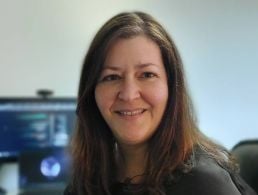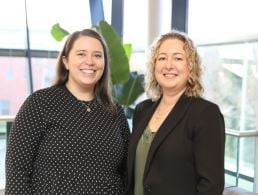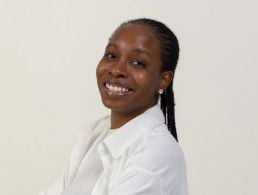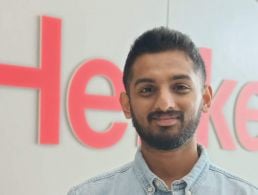Fidelity Investments’ Aoife Skelly says she was nervous to start her career after taking a year off, but a graduate programme was a ‘great way to refresh the mind’.
After making it through college and the hurdle of final-year exams, taking some time off is a popular next step. But could it impact how prepared you are to kick-start your career?
Here, computer science graduate Aoife Skelly explains how the Leap graduate programme at Fidelity Investments helped her “get back into the swing of things” as she took her first steps into the industry after taking a year off.
Supportive colleagues, instructor-led classes and making new friends at the company all helped her adjust.
Image: Aoife Skelly
With the Leap programme, are you now working in your desired industry?
Yes, most of what I covered in college was taught in this graduate programme. It was a great way to refresh the mind and be fully prepared for my new role in the IT industry.
What drew you to Fidelity Investments when you were seeking work as a graduate?
I hadn’t heard of Fidelity Investments until representatives came to my college and did a presentation to introduce students to the organisation. There were former graduates who gave an overview of their experiences with the Leap graduate programme and working at Fidelity afterwards. I was intrigued by what they had to offer, and I knew immediately I would love to work there.
What expectations did you have before you began the programme?
I was nervous. I had a year off before starting the programme and I was not sure how I would find getting back into the swing of things. I thought it might have been tough on me and I wasn’t sure how it was going to go, but in fact it was brilliant and I was able to keep up the whole time. Everyone was so supportive and I made great friends along the way.
What duties and responsibilities were you given initially?
We were given some instructions on how to set up our home environments and how to get to know each other as we would be working closely in teams to get projects and tasks done as part of the programme too. This helped us get set up for success.
Did the scope of your work change as the programme progressed?
Yes, for me it changed from personal development to instructor-led classes, to individual assessments and then a group project, which we were placed into teams to carry out.
Can you describe a typical day in your role?
A typical day would consist of training in the morning by an instructor-led class. In the afternoon we would work on our projects and if we needed support we could reach out to our team sponsors or our instructors.
How do your responsibilities compare to more experienced employees’?
They are very similar. Your role as a Leap graduate almost mimics what your role will be like when you graduate. You work in an agile environment, meaning you have hands-on experience to take with you when you take on your new role as an associate software engineer.
Did you feel more prepared for working life after completing this programme?
I felt ready and prepared to start my new role once the programme ended. I can definitely say that the graduate programme fully prepared me for working life.
Why should someone apply to the graduate programme at Fidelity?
Leap is an amazing graduate programme. The instructors are so helpful and supportive, the employees at Fidelity are fantastic and the atmosphere at Fidelity is truly one to love. I could not recommend it enough. Not only did I learn and grow during the programme, I also made great friends with my fellow graduates and we all had the best time together. If I could turn back time and do it all again, I would.




